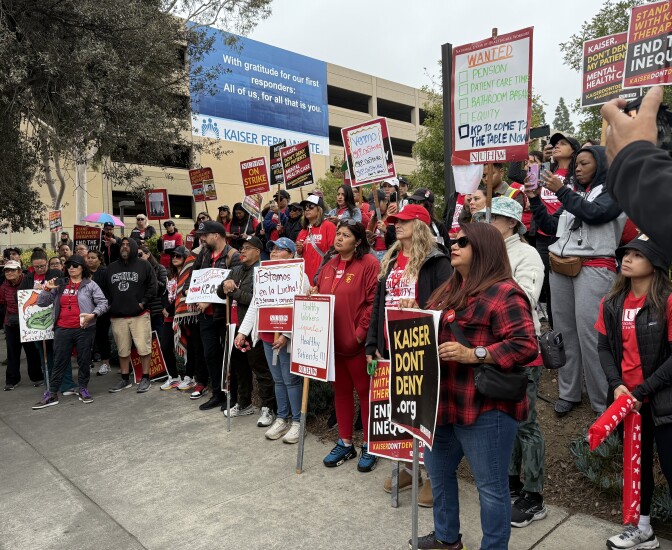This story is free to read because readers choose to support LAist. If you find value in independent local reporting, make a donation to power our newsroom today.
As the Kaiser strike drags on, state regulators say the company hasn’t corrected 'deficiencies' in mental health care

California regulators released a report this week that found Kaiser has yet to fix several “deficiencies” in behavioral health care for which it was cited years ago.
The report from the California Department of Managed Healthcare lists 20 deficiencies it found in 2022 based on state regulations, ranging from failing to provide non-urgent mental health and substance-use appointments within 10 days to not ensuring members are offered urgent care appointments within 48 hours of the request.
According to the report, Kaiser still had not corrected 19 of them.
The report comes as Kaiser mental health workers in Southern California prepare to enter the sixth month of a strike against the health care provider.
“This report shows why Kaiser Permanente mental health workers remain on strike,” Sal Rosselli, president emeritus of the National Union of Healthcare Workers, said in a statement. “Kaiser keeps saying everything is fine when its workers know that patients can’t get the care they need because Kaiser’s services are understaffed and underfunded.”
In a response included in the 88-page document, Kaiser Foundation Health Plan said it had made “substantial progress” in addressing issues brought up in the report as it “continues the transformation of its behavioral health program.”
“Despite the efforts of the National Union of Healthcare Workers to mislead the public, the Department of Managed Health Care has not identified new deficiencies in our mental health care,” Kaiser Permanente said in a statement to LAist, adding that the deficiencies in the report had not “gone unaddressed.”
The plan said all deficiencies outlined in the report had been addressed and were part of its corrective action plan to get in line with state regulations.
What the report from state regulators found
The strike comes more than a year after state regulators hit Kaiser with a $50 million fine for failing to provide timely access to mental health care and other problems.
As part of that settlement agreement, Kaiser committed to investing an additional $150 million over five years to expand and improve behavioral health care for members.
The report out this week from the Department of Managed Healthcare outlines 20 deficiencies that were found in Kaiser’s Northern and Southern California regions during a 2022 survey of operations and the status of the deficiency following the regulator’s review of compliance efforts.
They include:
- Failing to offer non-urgent mental health and substance use appointments within 10 days of the initial appointment request
- Not ensuring enrollees are offered urgent care appointments within 48 hours of the request
- Not enough oversight of suicide risk screenings.
“Health plans are required to provide their members with appropriate access to behavioral health care services, and the DMHC will continue to hold Kaiser Permanente accountable to these requirements in the law,” Director Mary Watanabe said in a statement.
Watanabe said Kaiser plans to remedy the deficiencies in the report through a corrective action plan required as part of the $200 million settlement agreement.
According to the report, state regulators will do a follow-up survey within 18 months to see if the issues have been corrected.
In a statement emailed to LAist, Kaiser Permanente said it was currently exceeding state requirements for timely access to care, meeting access timeframes “99.7% of the time for urgent care [and] 95% of the time for initial nonurgent care appointments.”
“The investments we’ve made over the last several years have resulted in significant improvements in access for our members,” the plan said.
The ongoing strike
In October, about 2,400 therapists, psychiatric nurses, psychologists and social workers represented by the union went on strike, pushing for better pay and pensions, as well as more time to conduct patient follow up.
In a statement this week, Kaiser said 60% of union-represented employees who chose not to strike or have since returned to work are continuing to serve patients, along with an outside network of “more than 13,000 providers.”
Last month, Gov Gavin Newsom urged the two groups to settle the strike through mediation, especially after the wildfires tore through Los Angeles County in January.
Newsom sent a letter to Greg Adams, CEO of Kaiser Permanente, and Sophia Mendoza, president of the National Union of Healthcare Workers, noting that Southern California residents “are grappling with extreme loss and displacement” after the fires.
Mark Ghaly, former California Secretary of Health and Human Services, and Darrell Steinberg, a former mayor of Sacramento, were tapped as mediators earlier this month, but negotiations have since stalled, according to the union.
Wednesday’s protest
More than 100 Kaiser employees and supporters rallied Wednesday outside the health provider's offices in Pasadena. Picketers held signs that read “Healthy workers equals health patients,” and “End the inequity.”
Patricia Arevalo-Porcelli, a licensed clinical psychologist, said she’s been a Kaiser employee for nearly three decades, and that some of her patients have shown up to support her on the picket lines over the course of the more than five-month strike.
Arevalo-Porcelli said she knows some mental health workers on strike are not only dealing with the financial stress of the work stoppage, but have also lost their homes in the Eaton Fire.
“The need for us to get back and be of service to the community who is truly grieving, deeply, is now more than ever,” she said.








